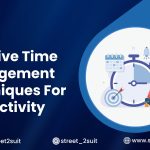Let’s be real for a second: if you’re still sending faxes, making spreadsheets by hand, or using an outdated version of Microsoft Word, you might as well be living in the early 2000s. And no, it’s not “retro”—it’s just *behind the times*.
In today’s job market, digital literacy is no longer a nice-to-have skill; it’s a must-have. Whether you’re working in finance, marketing, healthcare, or hospitality, tech is an integral part of virtually every field. If you’re not digitally savvy, you could be missing out on huge opportunities, and honestly, you might even get left behind.
What exactly is digital literacy?
It’s not just knowing how to scroll Instagram or avoid clicking on the wrong pop-up ad. It’s not also by being a tech keed or feeling at the top of the world when your millennial mother calls you to help her navigate some apps or settings on her phone.
Digital literacy is about understanding how to use technology to solve problems, communicate effectively, and improve productivity. And with today’s work culture increasingly based on digital tools, being digitally literate isn’t just about keeping up with the times—it’s about staying ahead of the curve.
How Digital Literacy Can Boost Your Job Prospects
But don’t worry, you don’t have to become a full-blown tech wizard or start writing code (unless that’s your thing, of course). With a few key skills and an openness to learning, digital literacy can give your job prospects a major boost. Here’s how.
Become a Productivity Powerhouse
Let’s start with the basics: efficiency. Whether you’re managing projects, tracking goals, or simply staying organized, digital tools can make your life a thousand times easier. Gone are the days of sticky notes scattered all over your desk and notebooks full of scribbled reminders. Now, there are tools for everything.
Project management apps like Trello, Asana, and Monday.com help you stay on top of tasks, set deadlines, and communicate with your team without feeling like you’re juggling 17 things at once. Learning how to use Google Calendar to manage your schedule or Google Drive to organize and share documents can make you look like you have your entire life together. And trust me, when employers see you can stay organized, they’ll know you’re a ‘keeper’.
Then there’s ‘Microsoft Excel’. You might think it’s just for accountants, but Excel is a tool that transcends industries. Being able to create a budget, track KPIs, or analyze data in Excel (or its equivalent like Google Sheets) is an essential skill. Employers love candidates who can take complex data and turn it into something actionable—plus, it makes you look like a numbers genius even if you aren’t.
Learning these tools won’t just help you get by in the workplace; they’ll make you a superstar. By automating tasks, collaborating online, and keeping everything organized in digital spaces, you’ll accomplish more in less time. And let’s be real: we could all use a little more time, right?
Access the World of Remote Work (Without Leaving Your Couch)
Remember the days when you had to put on pants and drive to an office every day? Those days are so 2019. Remote work has exploded in recent years, and companies are increasingly hiring people from all over the world. But here’s the catch: if you’re not digitally literate, you might miss out on these opportunities.
Digital tools like Zoom, Slack, Google Meet, and Microsoft Teams are the backbone of remote work. If you’re not familiar with these tools, you’re going to look like the person who still uses a landline in the age of cell phones. And let’s face it, nobody wants to be the person fumbling with a video call link in a virtual interview or not knowing how to mute themselves while eating lunch (guilty!).
Remote work isn’t just about video calls, either. Digital literacy means knowing how to collaborate on shared documents in real-time, organize your work in digital spaces, and communicate effectively through email or messaging apps. Being comfortable with these tools will give you access to job opportunities that are no longer limited to your local area. You could be working for a company halfway across the world from the comfort of your own home. Now, who wouldn’t want that? And the best part is, you can still be a couch potato and earn money!
Master Digital Communication (Without Sounding Like a Robot)
Digital communication is more than just typing out an email or sending a text message. It’s a whole new skill set in itself. The rise of online communication platforms means there’s a correct way to communicate in these spaces—and trust me, it’s not the same as texting your best friend.
Email etiquette, for example, is a huge part of professional digital communication. If you don’t know the difference between “Reply All” and “Reply” or when to use the BCC field, you’re already behind the curve. Being able to send clear, concise, and professional emails will make you seem competent and trustworthy. And yes, that means no more using “lol” in work emails (unless you want your boss to think you’re a bit unprofessional).
Then there’s Slack, which is now a must-have communication tool for many companies. You don’t just need to know how to send a message—you need to know how to use channels, manage notifications, and communicate quickly without overwhelming your coworkers. If you’re still using group texts to talk to your team, you’re definitely missing the boat.
Digital communication also includes video calls, and let me tell you, there’s a lot more to these than you might think. It’s not just about getting your camera angle right (though please, no more up-the-nose shots). You need to be able to participate in virtual meetings, manage screen sharing, and make sure you’re engaging with your audience—all from the comfort of your couch. With digital communication, it’s all about making your presence known without being physically present, which is a skill that employers will definitely appreciate.
Be Ready for Anything (The Digital World Never Stops Changing)
One of the best things about digital literacy is its adaptability. Technology evolves quickly, and you need to be ready to evolve with it. New apps, tools, and systems pop up constantly, and you need to stay on top of them to remain competitive in the job market. Being digitally literate means you’re not just familiar with today’s tools—you’re open to learning new ones as they come out.
Whether it’s adapting to a new software your company rolls out, learning how to use the latest social media trends for marketing, or diving into an emerging tech like Blockchain or AI, digital literacy keeps you flexible and ready for anything. Employers love candidates who are willing to learn and grow—especially when it comes to technology. It shows initiative, curiosity, and a willingness to adapt, which are all qualities of a standout employee.
And the best part? Digital literacy doesn’t require you to become a full-blown techie. Sure, learning to code might be cool, but you don’t need to be writing JavaScript to stay competitive in today’s job market. Being comfortable using the tools you need and staying open to new tech trends is enough to make you a *valuable asset* to any company.
Your Resume Will Shine Like a Beacon of Hope.
Let’s face it—employers aren’t just looking for a set of qualifications anymore; they want candidates who can hit the ground running. And if you’ve got digital skills in your back pocket, you’re already ahead of the game. Think about it: when a hiring manager sees that you’re comfortable with tools like Google Analytics, Photoshop, Salesforce, or even SEO, they know you can start contributing right away. You won’t need weeks of training on basic software—because you already get it.
But don’t just throw “Excel” or “WordPress” on your resume and call it a day. Employers want to see how you’ve used these tools to deliver real results. Maybe you used **Google Analytics** to boost website traffic or **Photoshop** to create marketing assets that increased engagement. When you show you can use digital tools to solve problems and drive business outcomes, you’ll be a much more appealing candidate.
Plus, as companies become more reliant on digital tools and online platforms, knowing your way around these programs makes you an even more valuable employee. The more tools you’re comfortable with, the more likely you are to stand out.
Climb the Career Ladder (Without Missing a Step)
Finally, digital literacy isn’t just about getting hired—it’s about advancing your career. Once you’ve mastered the basics, your digital skills open up new doors for you. Want to move into management? You’ll need digital tools to communicate with teams, manage schedules, and track performance. Want to become a digital marketer? You’ll need to understand tools like ‘Google Ads’ and ‘Hootsuite’ to create campaigns. Want to break into project management? Familiarity with tools like Basecamp and Jira will make you look like a natural leader.
No matter the role, the more digital tools you know how to use, the more likely you are to climb the career ladder. Companies are looking for employees who can make their processes more efficient, save time, and drive results—and that’s exactly what being digitally literate allows you to do.
Conclusion: The Digital Age Is Here—Are You Ready?
In a world that’s increasingly dependent on technology, digital literacy isn’t just a nice perk—it’s a game-changer. It opens up job opportunities, makes you more productive, and helps you stand out from the crowd. Whether you’re just starting out or looking to level up in your career, investing in digital skills is one of the best decisions you can make.
So, stop avoiding the tech stuff. Embrace the
Digital age, learn the tools you need, and watch your job prospects soar. Because, if you don’t, the digital world will leave you in the dust—and nobody wants that.
Receive the latest job and career updates in your inbox, every week!
Mariam is an imaginative and meticulous writer who is passionate about crafting compelling narratives and translating concepts into influential content.




